Empowering Data Teams: The Importance of Business Literacy
In today’s data-driven world, empowering data teams with business literacy is no longer optional—it’s essential for effective data leadership. When your data teams understand the business context behind their work, they transform from technical support into strategic partners. This shift enables them to align their insights with organizational goals, driving meaningful outcomes. Studies reveal that organizations embracing a data-driven mindset achieve greater adaptability and innovation. By prioritizing business literacy, you unlock the potential for data-driven success, fostering a culture where data becomes a catalyst for growth and a cornerstone of decision-making.
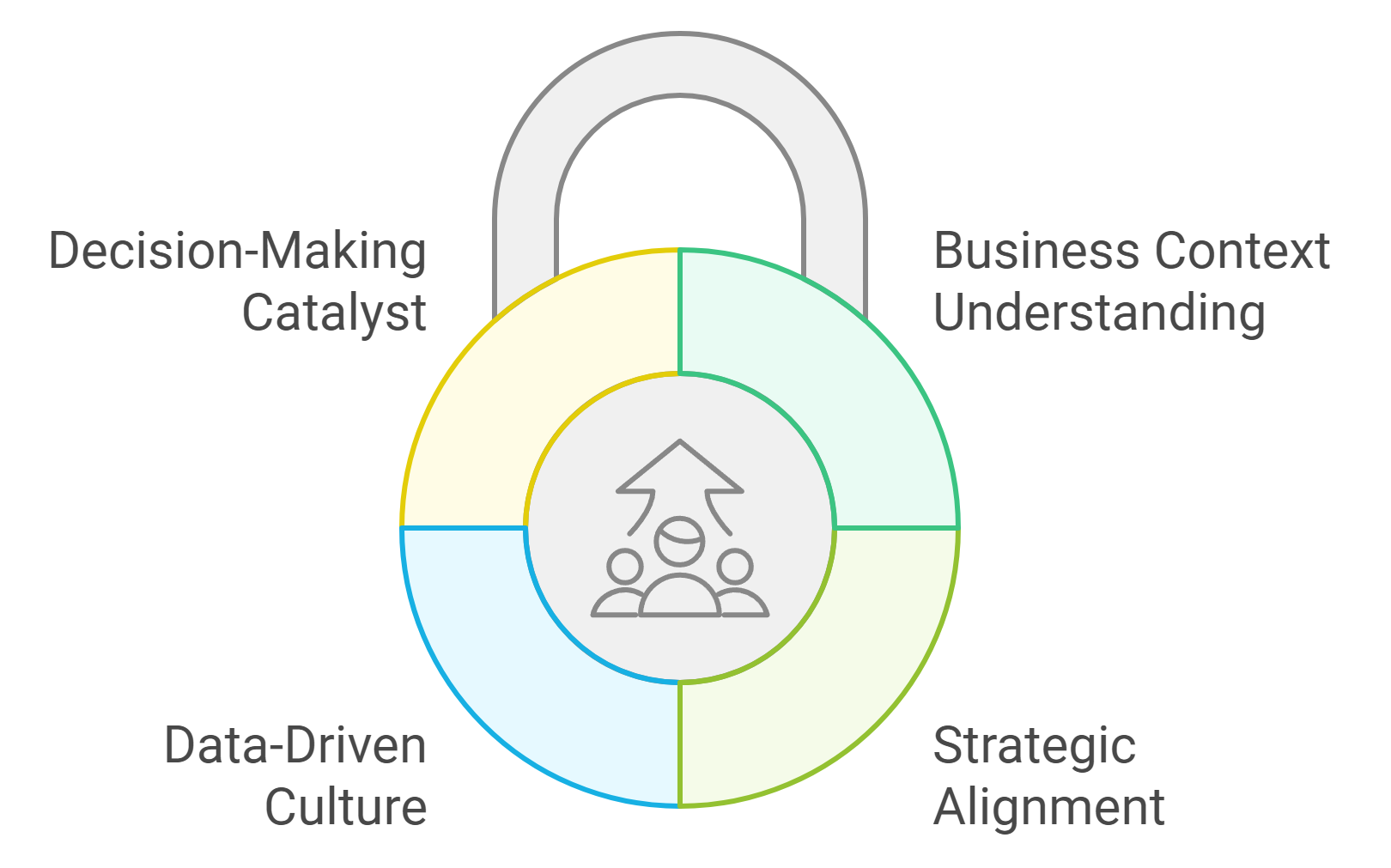
Key Takeaways
Business literacy is essential for data teams to align their insights with organizational goals, transforming them into strategic partners.
Understanding the business context behind data analysis enhances decision-making and ensures that insights address real-world challenges.
Integrating business literacy into data literacy training fosters collaboration between technical and non-technical teams, breaking down silos.
Investing in business literacy leads to improved alignment with strategic objectives, driving measurable outcomes and organizational success.
Encouraging cross-functional collaboration helps data teams gain valuable insights into different business areas, enhancing their analytical capabilities.
Leadership support is crucial for promoting business literacy initiatives, ensuring that teams have the resources and recognition they need to succeed.
A strong data culture, rooted in business literacy, empowers teams to make informed decisions and adapt to changing market conditions.
Understanding Business Literacy in the Context of Data Teams
Defining Business Literacy for Data Professionals
Business literacy equips you with the knowledge to understand how your organization operates, generates revenue, and achieves its goals. For data professionals, this means going beyond technical expertise to grasp the broader business landscape. When you understand the "why" behind the numbers, your insights become more actionable and aligned with strategic objectives.
"The onus for teaching business literacy to data teams falls on the business itself," as highlighted in a Data World Blog article. This underscores the importance of onboarding new data hires with a clear understanding of how the company functions. By doing so, you can bridge the gap between technical data analysis and real-world business impact.
Mastering business literacy allows you to connect your data work to the organization's mission. It transforms your role from simply analyzing data to actively driving business success.
The Intersection of Business Literacy and Data Literacy
Business literacy and data literacy are two sides of the same coin. While data literacy focuses on your ability to collect, interpret, and communicate data effectively, business literacy ensures you understand the context in which that data exists. Together, they empower you to make informed decisions that resonate with organizational goals.
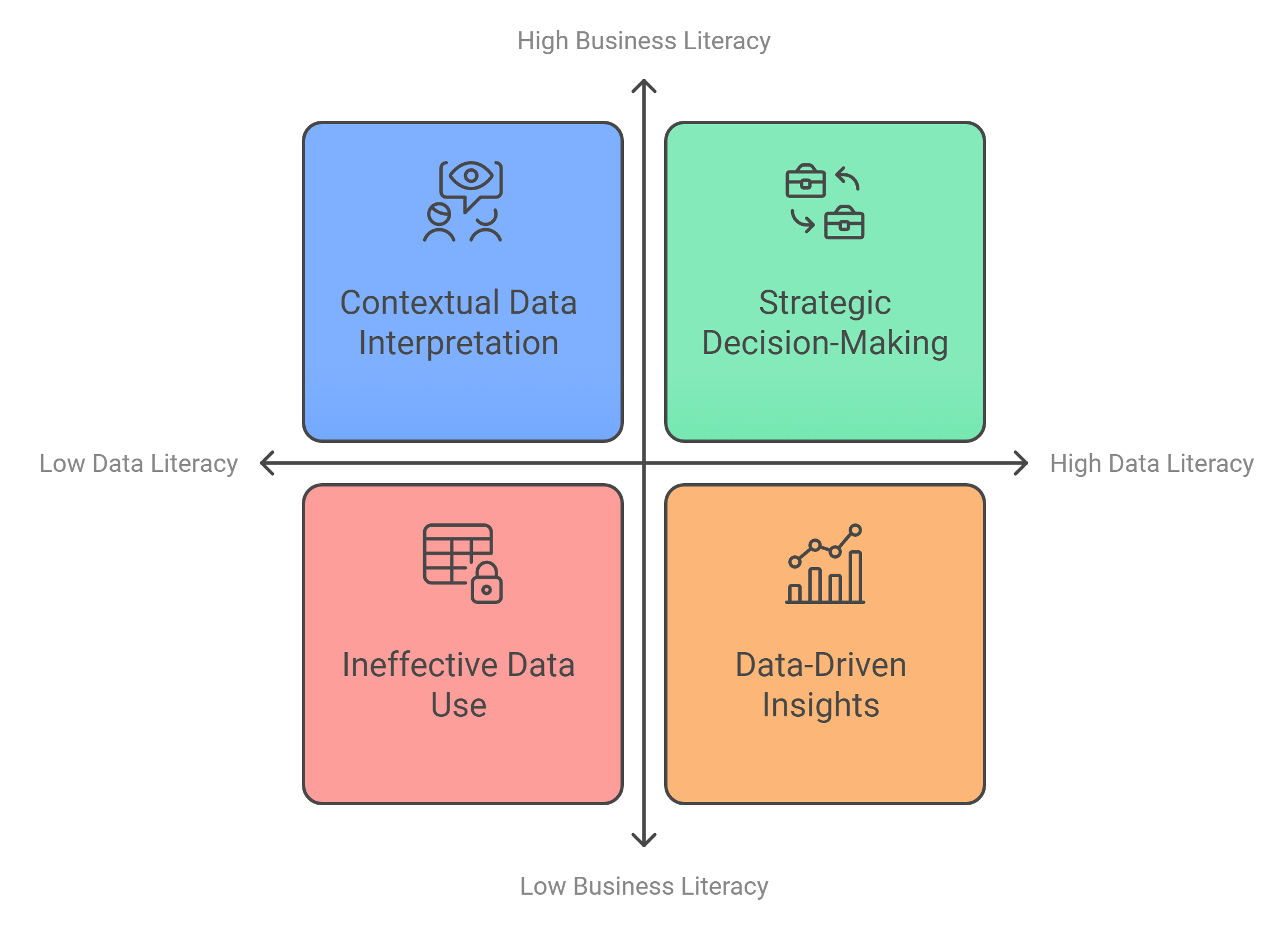
For instance, when you combine data literacy skills with business literacy, you can identify trends that directly impact revenue or customer satisfaction. According to the Workast Blog, "Understanding how to use data to inform decisions and optimize efficiency can lead to more successful business outcomes." This synergy enables you to move beyond raw numbers and deliver insights that matter.
By integrating these two forms of literacy, you position yourself as a vital contributor to your organization's strategy. You not only interpret data but also translate it into meaningful actions that drive growth.
Why Business Literacy Is Essential for Empowering Data Teams
Empowering data teams starts with equipping them with business literacy. Without it, even the most skilled data professionals may struggle to align their work with the company's objectives. When you understand the business context, you can tailor your data analysis to address specific challenges and opportunities.
A study from the Pecan AI Blog emphasizes that "Investing in data literacy for leaders is an investment that provides significant returns." The same principle applies to data teams. When you invest in business literacy, you unlock the potential to transform data teams into strategic partners. This shift fosters collaboration between technical and non-technical teams, ensuring everyone works toward shared goals.
Business literacy also enhances your ability to communicate insights effectively. Instead of presenting complex data sets, you can deliver clear, actionable recommendations that resonate with decision-makers. This not only boosts your credibility but also strengthens your team's role within the organization.
The Role of Business Literacy in Building a Thriving Data Culture
Aligning Data Insights with Business Objectives
Your data teams hold the power to transform raw data into actionable insights. However, without a clear understanding of business objectives, even the most advanced data analytics can miss the mark. Business literacy bridges this gap by helping you align data insights with organizational goals. When you understand the "why" behind your work, you can tailor your analysis to address specific challenges and opportunities.
For example, if your company aims to improve customer retention, business literacy enables you to focus on metrics that matter, such as churn rates or customer satisfaction scores. This alignment ensures that your insights directly contribute to achieving strategic outcomes. As a result, your data teams become indispensable partners in driving success.
"Organizations with strong business literacy in data teams outperform those without," as research consistently shows. By aligning data insights with business objectives, you unlock the full potential of your data-driven culture.
Bridging the Gap Between Data Teams and Business Units
Collaboration between data teams and business units often determines the success of data initiatives. Yet, a lack of shared understanding can create silos, limiting the impact of your efforts. Business literacy acts as a unifying force, enabling you to communicate effectively with stakeholders across the organization.
When your data teams understand the language of business, they can present insights in ways that resonate with decision-makers. Instead of overwhelming others with technical jargon, you can deliver clear, actionable recommendations. This approach fosters trust and strengthens relationships between technical and non-technical teams.
Consider this: A marketing team struggling to optimize campaign performance can benefit immensely from data-driven insights. By bridging the gap, your data teams can provide targeted recommendations that align with marketing goals. This collaboration not only enhances outcomes but also reinforces the value of a cohesive data culture.
Fostering a Collaborative Data Culture Across the Organization
A thriving data culture thrives on collaboration. Business literacy empowers you to break down barriers and create an environment where everyone feels confident engaging with data. When all teams share a common understanding of business goals, they can work together more effectively to achieve them.
To foster collaboration, encourage open communication and knowledge sharing. Host cross-functional workshops where data teams and business units can exchange ideas and learn from each other. Promote a mindset where data is seen as a shared resource, not the sole responsibility of one department.
"Data teams need to become business literate to provide the greatest value to a data-driven enterprise," as experts emphasize. By fostering a collaborative culture, you ensure that data insights drive meaningful change across the organization.
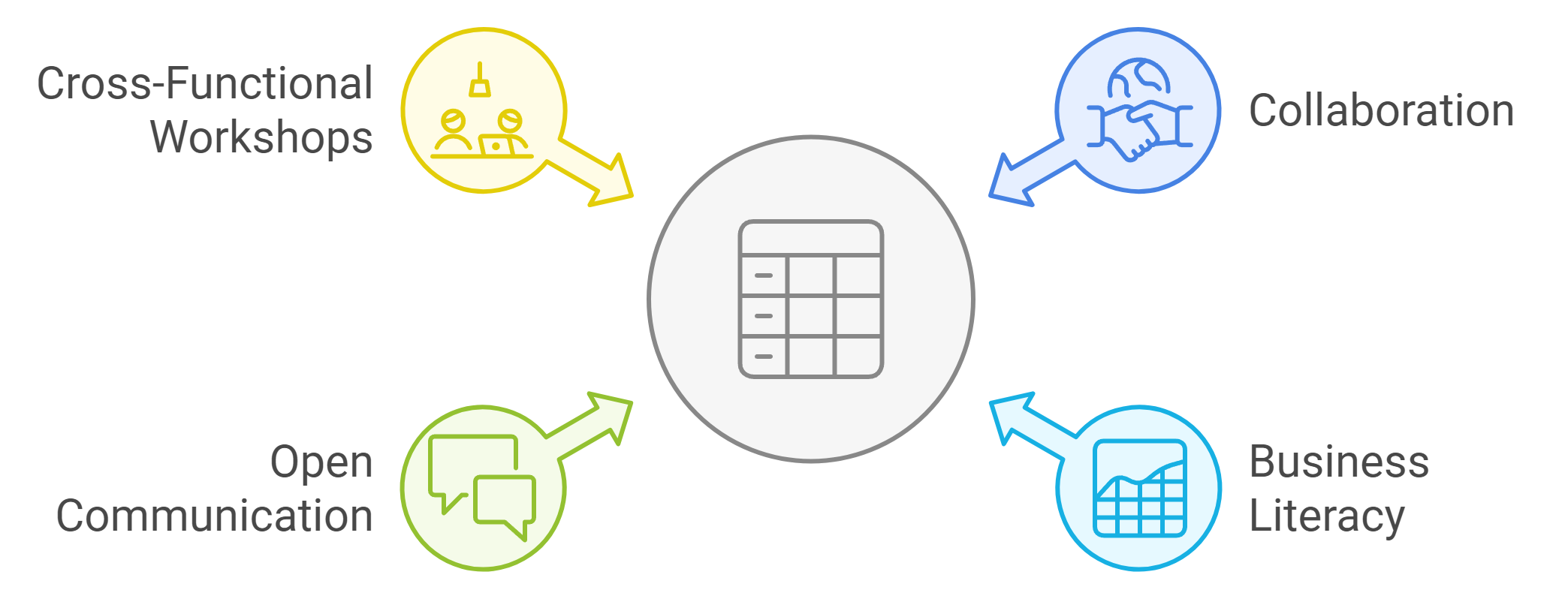
Empowering data teams with business literacy transforms them into strategic partners. This shift not only enhances decision-making but also strengthens the foundation of your data-driven culture. Together, you can unlock new opportunities and achieve lasting success.
Key Benefits of Business Literacy for Data Teams
Enhanced Decision-Making Through Business Context
Understanding the business context transforms how you approach data. When you grasp the "why" behind your analysis, your decisions become sharper and more impactful. Business literacy equips you to connect data insights with real-world challenges, ensuring your recommendations address the organization's needs.
For example, companies that invest in financial education programs report improved decision-making across teams. This happens because employees can interpret data within the framework of business goals. By applying this principle, you empower your data teams to make data-driven decisions that align with strategic objectives.
"Data-driven decision-making thrives when teams understand the business landscape," as industry leaders often emphasize. With business knowledge, you can identify patterns, predict outcomes, and propose solutions that drive success.
When you combine data literacy skills with business literacy, you unlock the ability to make informed choices. This synergy ensures your decisions are not just based on numbers but also on a deep understanding of their implications.
Improved Alignment with Strategic Business Goals
Business literacy bridges the gap between data analytics and organizational strategy. When you understand the company's objectives, you can tailor your analysis to support them. This alignment ensures your work contributes directly to achieving key goals.
Organizations with strong data literacy skills report a 40% increase in engagement after implementing training programs. This improvement stems from teams aligning their efforts with the company's vision. By fostering business literacy, you ensure your data teams focus on metrics that matter most.
Consider a scenario where your company aims to expand its market share. With business literacy, you can analyze customer behavior, identify growth opportunities, and recommend actionable strategies. This approach positions your data teams as strategic partners, driving measurable outcomes.
"Success comes from aligning data insights with business priorities," as experts frequently highlight. By understanding the bigger picture, you ensure your contributions propel the organization forward.
Strengthened Collaboration Between Technical and Non-Technical Teams
Collaboration flourishes when everyone speaks a common language. Business literacy enables your data teams to communicate effectively with non-technical colleagues. Instead of relying on technical jargon, you can present insights in ways that resonate with diverse audiences.
This shared understanding fosters trust and strengthens relationships across departments. Leaders who leverage data literacy skills for strategic action often demonstrate the tangible benefits of collaboration. By empowering data teams with business knowledge, you create an environment where ideas flow freely.
Imagine a product development team working alongside data analysts. With business literacy, your data teams can provide insights that guide design decisions, ensuring the product meets market demands. This partnership not only enhances outcomes but also reinforces the value of teamwork.
"Empowering data teams with business literacy builds bridges across the organization," as research consistently shows. By fostering collaboration, you unlock the full potential of your data-driven culture.
When technical and non-technical teams work together seamlessly, the entire organization benefits. Business literacy serves as the foundation for this unity, driving innovation and success.
Developing a Data Literacy Framework to Support Business Literacy
Establishing Core Competencies for Data and Business Literacy
Building a strong foundation begins with identifying the core competencies your team needs. These competencies should encompass both technical data skills and a deep understanding of business operations. By defining these essential skills, you create a roadmap for developing well-rounded, business-literate employees.
Start by assessing the current capabilities of your data teams. Identify gaps in their knowledge of business processes, revenue models, and strategic goals. Then, outline the specific skills they need to bridge these gaps. For example, understanding financial metrics, customer behavior, and market trends can significantly enhance their ability to align data insights with business objectives.
"The more ingrained data-driven decision-making becomes at your organization, the more important it is that your data teams understand the business context of the data they’re collecting, analyzing, and presenting."
By focusing on these core competencies, you empower your team to connect their technical expertise with real-world business challenges. This alignment transforms data analysis into actionable insights that drive success.
Integrating Business Literacy into Data Literacy Training Programs
To foster a culture of collaboration and strategic thinking, integrate business literacy into your existing data literacy training programs. This approach ensures that your team not only masters data analytics but also understands the broader context in which their work operates.
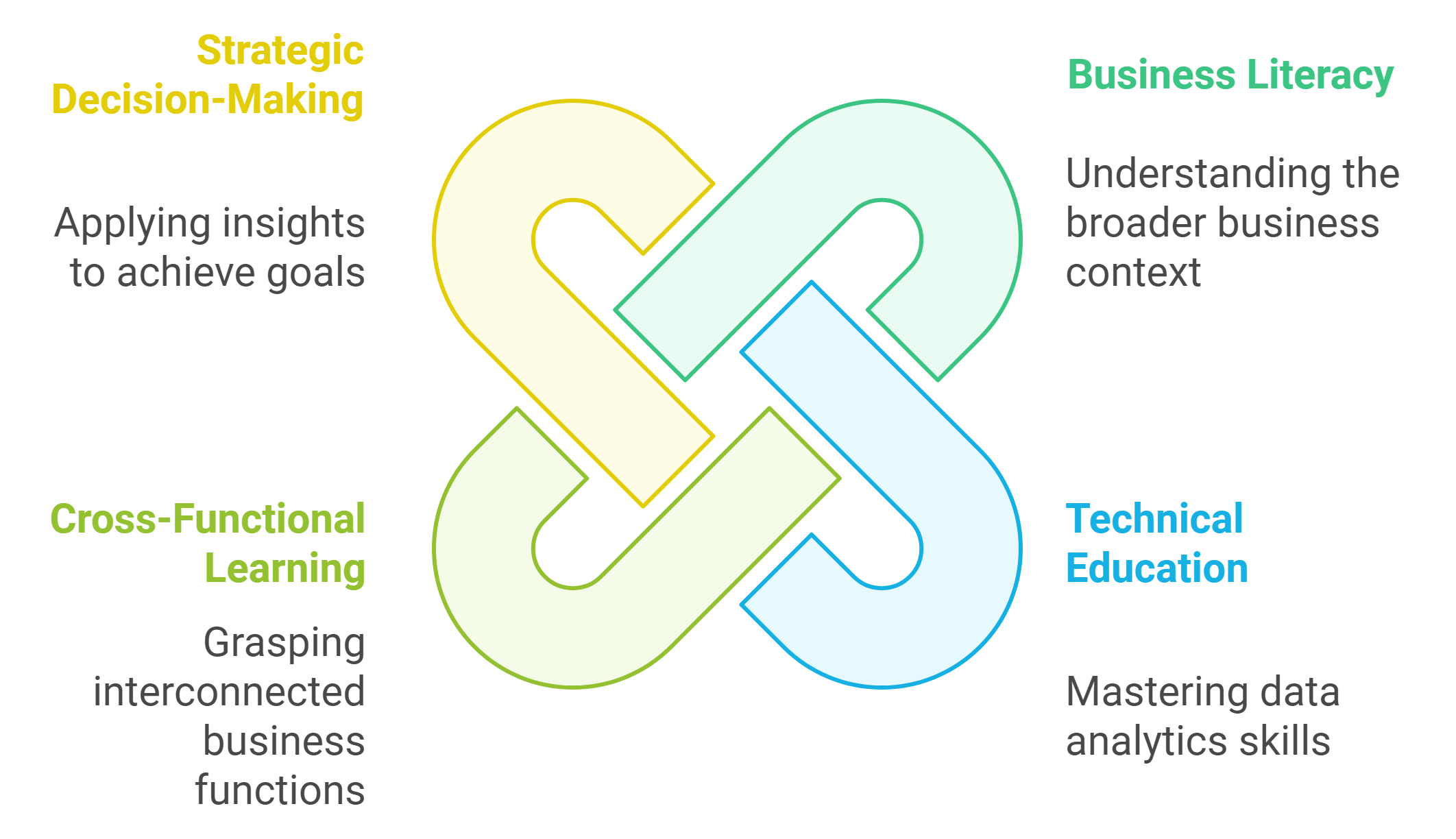
Design training modules that combine technical and business education. For instance, pair lessons on data visualization with case studies that demonstrate how these visuals impact decision-making. Include scenarios where participants must analyze data within the framework of business goals, such as improving customer retention or optimizing supply chains.
A comprehensive data literacy program should also encourage cross-functional learning. Invite leaders from different departments to share insights about their roles and challenges. This exposure helps your data teams grasp the interconnectedness of various business functions, enhancing their ability to deliver relevant and impactful insights.
"Integrating business literacy into training programs enhances data team effectiveness."
By embedding business literacy into your data literacy strategy, you create a workforce that excels in both technical and strategic domains. This dual expertise positions your team as invaluable partners in achieving organizational goals.
Measuring Progress with a Comprehensive Data Literacy Framework
Tracking progress is essential to ensure the success of your data literacy strategy. A comprehensive data literacy framework provides the structure you need to evaluate and refine your efforts. This framework should include clear benchmarks for both data skills and business literacy.
Begin by setting measurable goals. For example, aim to increase the percentage of employees who can confidently interpret financial reports or identify key performance indicators. Use surveys, quizzes, and practical assessments to gauge their understanding and application of these concepts.
Regularly review the outcomes of your data literacy training initiatives. Analyze how well your team applies their knowledge to real-world scenarios. Are they aligning data insights with strategic objectives? Are they effectively communicating their findings to non-technical stakeholders?
"Success comes from aligning data insights with business priorities."
By continuously measuring progress, you can identify areas for improvement and celebrate milestones. This iterative approach ensures that your data literacy framework evolves alongside your organization's needs, driving sustained growth and innovation.
Practical Steps to Foster Business Literacy in Data Teams
Implementing Targeted Training and Development Programs
Empowering your data teams begins with focused training programs. These programs should address both technical skills and the broader business landscape. By doing so, you ensure that your team not only excels in data analytics but also understands how their work impacts the organization’s goals.
Start by identifying specific areas where your team needs growth. For example, if your team struggles to connect data insights to business outcomes, introduce workshops that teach them how to interpret financial metrics or customer behavior. Incorporate real-world scenarios into these sessions to make the learning process practical and engaging.
"The onus for teaching business literacy to data teams falls on the business itself," as industry leaders often emphasize. This means you must take responsibility for equipping your team with the tools they need to succeed.
Encourage continuous learning by offering access to online courses, certifications, or mentorship programs. These resources help your team stay updated on industry trends and enhance their ability to align data insights with strategic objectives. When you invest in targeted training, you create data literate employees who can drive meaningful change.
Encouraging Cross-Functional Collaboration and Knowledge Sharing
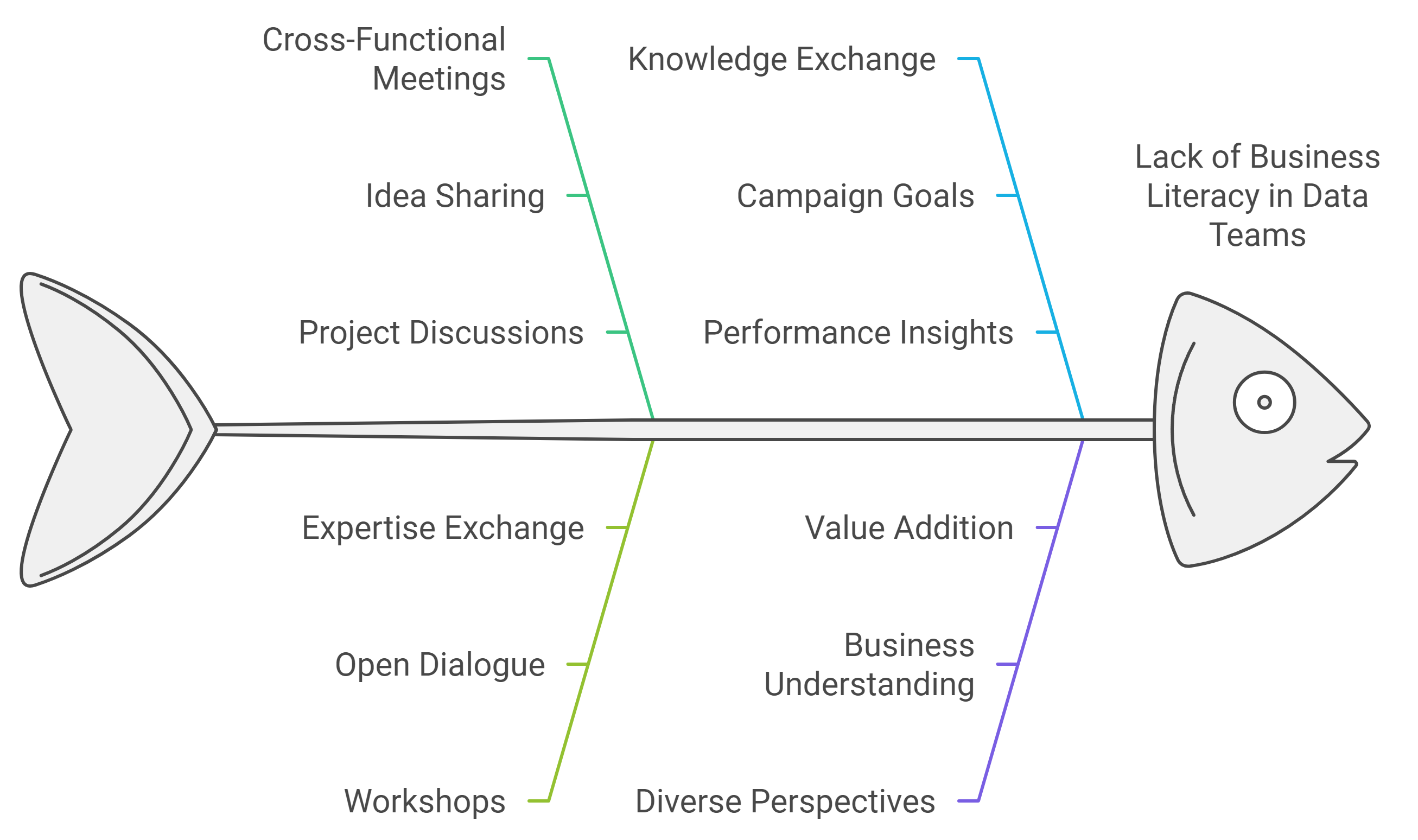
Collaboration across departments is essential for fostering a culture of business literacy. When your data teams work closely with other units, they gain valuable insights into the challenges and goals of different areas within the organization. This understanding enables them to tailor their analysis to meet specific needs.
Organize regular cross-functional meetings where data teams and business units can share ideas and discuss ongoing projects. These sessions provide an opportunity for knowledge exchange and help break down silos. For instance, marketing teams can share campaign goals, while data teams offer insights to optimize performance.
Host interactive workshops or brainstorming sessions to encourage open dialogue. These activities create a space where everyone feels comfortable sharing their expertise. By promoting collaboration, you ensure that data literacy initiatives benefit the entire organization.
"Data teams need to become business literate to provide the greatest value to a data-driven enterprise," as experts frequently highlight. Cross-functional collaboration accelerates this process by exposing your team to diverse perspectives.
When your team actively engages with other departments, they develop a deeper understanding of the business. This knowledge enhances their ability to deliver actionable insights that drive success.
Securing Leadership Support for Business Literacy Initiatives
Leadership plays a pivotal role in the success of business literacy initiatives. Without their support, efforts to enhance your team’s skills may lack the necessary resources and momentum. Leaders must champion these initiatives and recognize their long-term value.
Begin by presenting a clear case for why business literacy matters. Highlight how it improves decision-making, aligns data insights with strategic goals, and fosters collaboration. Use examples or case studies to demonstrate the tangible benefits of investing in data literacy training.
"Changing how leaders make decisions takes time and commitment to long-term learning," as data leaders often note. Securing leadership buy-in ensures that your initiatives receive the attention and funding they deserve.
Encourage leaders to participate in training sessions alongside your team. This involvement not only sets an example but also helps them understand the challenges and opportunities associated with data literacy. When leaders actively engage, they inspire others to follow suit.
Finally, emphasize the importance of a systematic approach. Establish clear goals, track progress, and celebrate milestones to maintain momentum. With strong leadership support, your business literacy initiatives will thrive and deliver lasting impact.
Overcoming Challenges in Promoting Business Literacy
Addressing Resistance to Change Within Data Teams
Resistance to change often emerges as one of the biggest hurdles when promoting business literacy. You may encounter team members who feel overwhelmed by the idea of stepping outside their technical expertise. This resistance can stem from fear of failure or a belief that business knowledge is irrelevant to their role. To overcome this, you need to create an environment where learning feels safe and rewarding.
Start by showing how business literacy can elevate their work. For example, when data professionals understand the business context, they can uncover insights that directly impact organizational success. Highlight success stories where teams used business knowledge to drive meaningful outcomes.
"Employees who could offer great insights may never find the inspiration if they're unable to understand vital data."
Encourage open conversations about the benefits of business literacy. Host workshops or informal discussions where team members can share their concerns and ask questions. When you address their fears and provide clear examples of how business literacy enhances their roles, you pave the way for acceptance and enthusiasm.
Balancing Technical Expertise with Business Acumen
Balancing technical expertise with business acumen can feel like walking a tightrope. Data professionals often focus on mastering technical skills, leaving little room for understanding business operations. However, this balance is essential for creating well-rounded team members who can connect data insights to strategic goals.
You can start by integrating business concepts into existing technical training programs. For instance, pair lessons on data analytics with case studies that demonstrate how these skills solve real-world business challenges. This approach ensures that your team learns to view data through a business lens.
"Business leaders need to understand what their data teams are showing them."
Encourage your team to collaborate with other departments. Cross-functional projects provide valuable exposure to different aspects of the business. For example, working with the marketing team on campaign analysis helps data professionals understand customer behavior and revenue impact. This hands-on experience bridges the gap between technical expertise and business acumen.
Managing Time and Resource Constraints Effectively
Time and resource constraints often hinder efforts to promote business literacy. You may feel that there’s never enough time to train your team while managing ongoing projects. However, prioritizing business literacy doesn’t have to disrupt your workflow. Small, consistent steps can lead to significant progress.
Begin by incorporating microlearning sessions into your schedule. Short, focused lessons on topics like financial metrics or customer trends can fit seamlessly into your team’s day. These sessions require minimal time but deliver maximum impact.
"Low data literacy is holding many teams back and stalling data analysis and digital transformation initiatives."
Leverage existing resources to minimize costs. Online courses, webinars, and internal knowledge-sharing sessions can provide valuable learning opportunities without straining your budget. Encourage team members to share their expertise with peers, creating a culture of continuous learning.
Finally, secure leadership support to allocate resources effectively. Present a clear case for how business literacy drives better decision-making and aligns data insights with strategic goals. When leaders recognize the value of these initiatives, they are more likely to invest in the necessary tools and time.
Real-World Examples of Empowering Data Teams Through Business Literacy
Case Study: Driving Revenue Growth with Business-Literate Data Teams
Imagine a retail company struggling to boost its revenue despite having access to vast amounts of data. The turning point came when the organization decided to invest in business literacy for its data teams. By understanding how the company generated revenue and what factors influenced customer behavior, the data professionals began aligning their analysis with the company’s strategic goals.
For instance, the team identified that a significant portion of revenue came from repeat customers. With this insight, they focused on analyzing customer retention metrics and purchasing patterns. Their findings revealed that personalized promotions and loyalty programs could significantly enhance customer engagement. Acting on these recommendations, the company launched targeted campaigns, resulting in a 25% increase in repeat purchases within six months.
"When your business teams are data literate and your data teams are business literate, their common language of business knowledge will ensure each is providing the greatest value to your data-driven enterprise," as emphasized by Data World. This case demonstrates how empowering data teams with business literacy can directly impact revenue growth.
Case Study: Streamlining Operations Through Data-Driven Insights
A manufacturing firm faced inefficiencies in its supply chain, leading to delays and increased costs. The company decided to empower its data teams with business literacy, enabling them to understand the operational challenges and financial implications of these inefficiencies.
Armed with this knowledge, the data teams analyzed production schedules, inventory levels, and supplier performance. They discovered that inconsistent supplier deliveries were causing bottlenecks in the production process. By presenting these insights to the operations team in clear, actionable terms, they recommended renegotiating contracts with reliable suppliers and optimizing inventory management.
The result? The company reduced production delays by 40% and cut supply chain costs by 15%. This success highlights how combining data analytics with business literacy can streamline operations and drive measurable outcomes.
Lessons Learned from Organizations with Strong Data Cultures
Organizations with strong data cultures consistently demonstrate the value of integrating business literacy into their data teams. These companies prioritize collaboration, ensuring that data professionals understand the broader business context of their work. This approach fosters a shared vision where every team member contributes to achieving organizational goals.
Key lessons from these organizations include:
Invest in Training: Provide targeted programs that combine technical skills with business education. This equips your data teams to deliver insights that align with strategic objectives.
Encourage Cross-Functional Collaboration: Create opportunities for data teams to work closely with other departments. This exposure enhances their understanding of business challenges and strengthens their ability to provide relevant solutions.
Measure Impact: Regularly evaluate how well your data teams apply their business literacy skills. Use metrics to track improvements in decision-making, operational efficiency, and overall performance.
By adopting these practices, you can cultivate a thriving data culture where data insights drive innovation and success.
The Role of Leadership in Cultivating Business Literacy
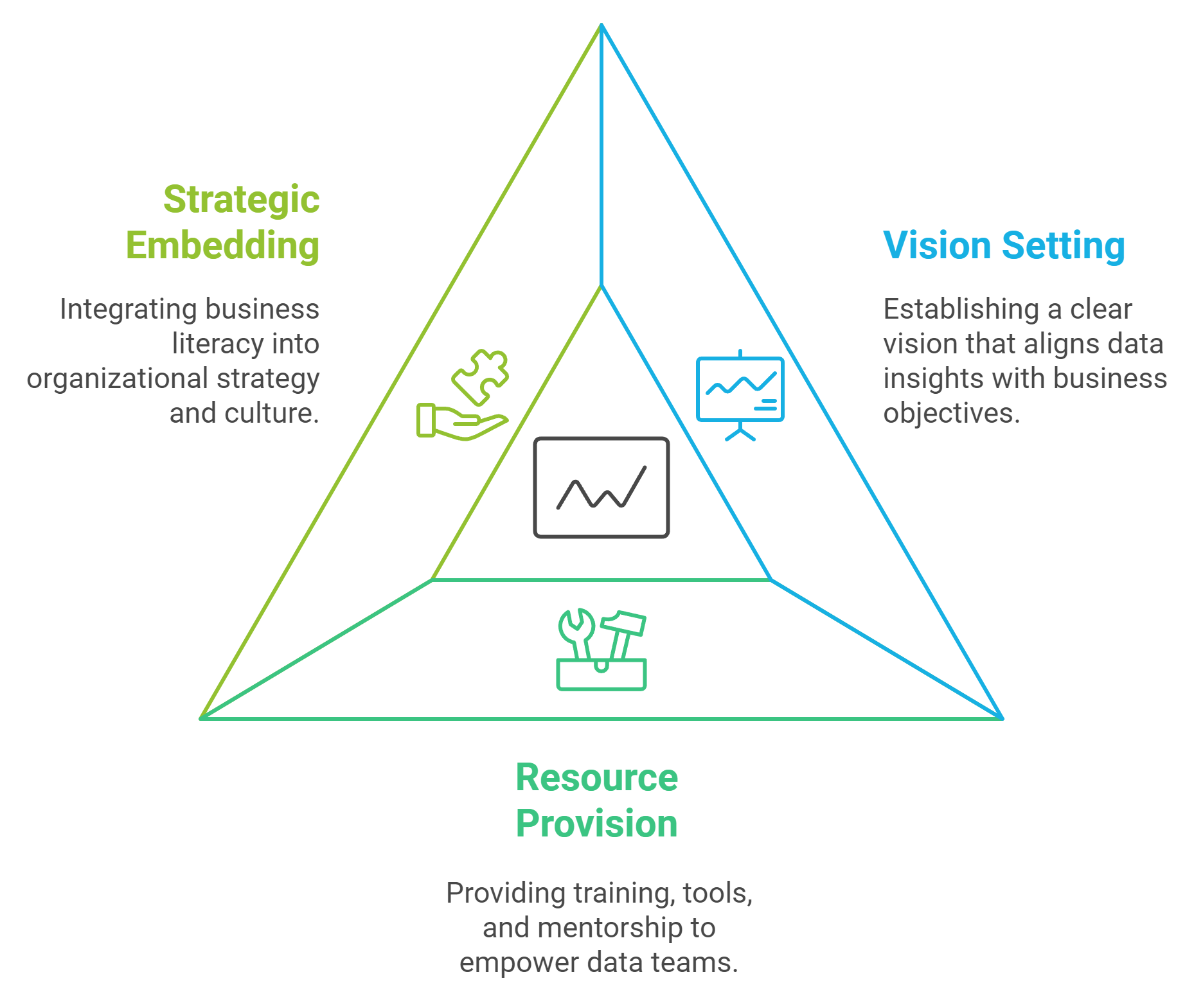
Setting a Vision for Empowering Data Teams
Leadership begins with vision. As a leader, you set the tone for how your organization values business literacy. By clearly articulating the importance of empowering data teams, you inspire others to embrace this mindset. A strong vision ensures that everyone understands the role of business literacy in driving success.
"Changing how leaders make decisions takes time. But it’s faster and easier with a systematic approach," emphasizes industry experts. Your commitment to long-term learning and adaptation creates a foundation for meaningful change. When you champion business literacy, you encourage your team to connect their technical expertise with strategic goals.
To set this vision, communicate the benefits of aligning data insights with business objectives. Share examples of how business-literate data teams have transformed organizations. Highlight the potential for improved decision-making, stronger collaboration, and measurable outcomes. Your vision should inspire action and foster a culture where data becomes a strategic asset.
Providing Resources and Recognition for Business Literacy Efforts
Empowering your data teams requires more than just words. You must provide the resources they need to succeed. This includes access to training programs, tools, and mentorship opportunities. By investing in their growth, you demonstrate your commitment to building a business-literate workforce.
Start by allocating resources for targeted training initiatives. Offer workshops that combine data analytics with business concepts. Provide access to online courses or certifications that enhance both technical and business skills. Encourage cross-functional collaboration to expose your team to different aspects of the organization.
Recognition also plays a crucial role. Celebrate milestones and achievements related to business literacy. Acknowledge team members who apply their knowledge to drive impactful results. Publicly highlight their contributions to reinforce the value of these efforts.
"The onus for teaching business literacy to data teams falls on the business itself," as experts often stress. Your leadership ensures that these initiatives receive the attention and support they deserve. By providing resources and recognition, you create an environment where business literacy thrives.
Embedding Business Literacy into Organizational Strategy
For business literacy to become a cornerstone of your organization, it must be embedded into your strategy. This integration ensures that it remains a priority across all levels and departments. Leaders play a pivotal role in aligning business literacy with the organization's long-term goals.
Begin by incorporating business literacy into your strategic planning process. Define clear objectives for how data teams will contribute to achieving these goals. Establish metrics to measure progress and hold teams accountable for aligning their work with business outcomes.
"Our scarcest resource is globally literate leaders," warns Alfred Zeien, former CEO of The Gillette Co. This insight underscores the importance of embedding literacy into leadership development. Equip your leaders with the skills to champion data-driven decision-making and foster a culture of collaboration.
Make business literacy a part of your organizational DNA. Include it in onboarding programs, performance evaluations, and leadership training. Regularly review and refine your approach to ensure it evolves with your organization's needs. By embedding business literacy into your strategy, you position your organization for sustained success.
Measuring the Impact of Business Literacy on Data Teams
Key Metrics for Evaluating Business Literacy Initiatives
Measuring the impact of business literacy begins with identifying the right metrics. These metrics help you evaluate how well your data literacy initiatives are performing and whether they align with your organizational goals. Start by focusing on measurable outcomes that reflect the effectiveness of your efforts.
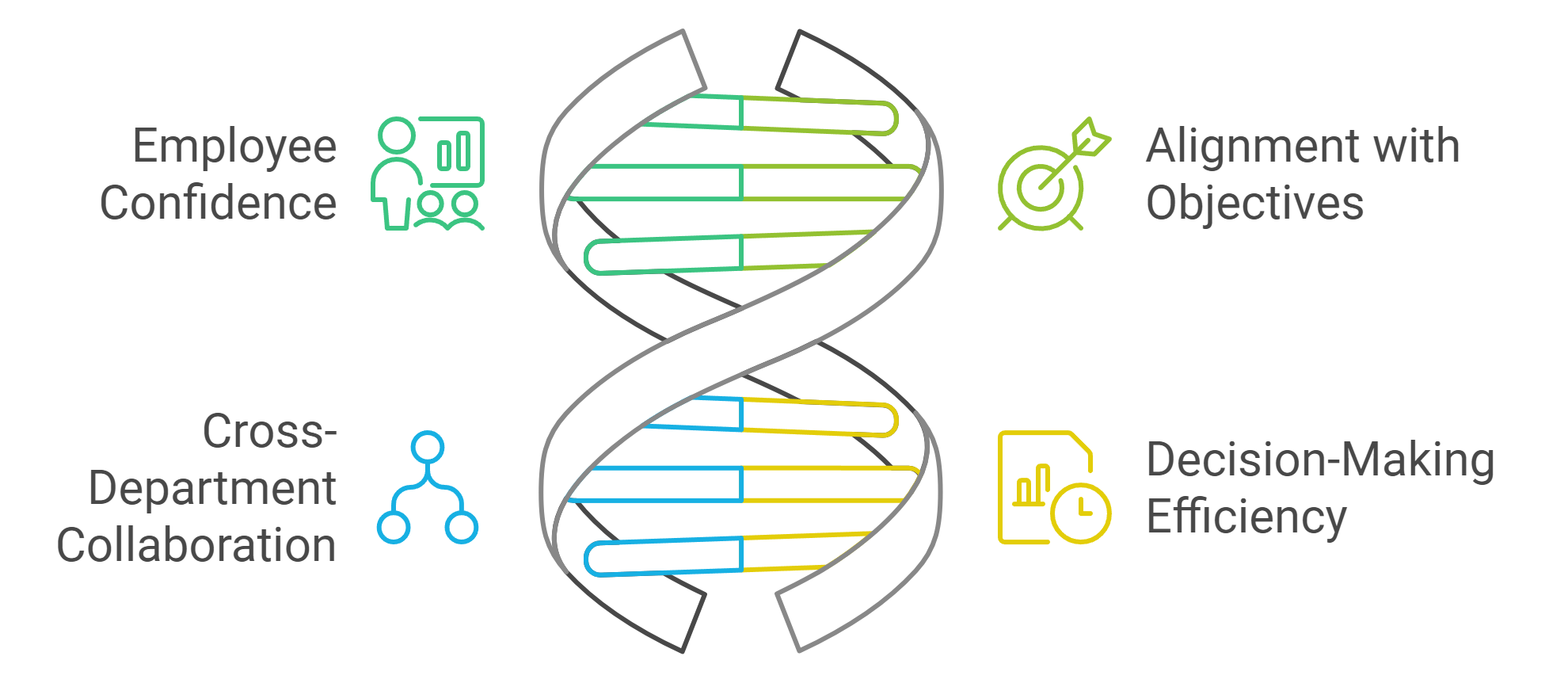
Employee Confidence in Data Usage: Track how comfortable your team feels when working with data. Surveys or self-assessments can reveal improvements in their ability to analyze and interpret data within a business context.
Alignment with Business Objectives: Measure how often data insights directly contribute to achieving strategic goals. This alignment demonstrates the value of combining technical expertise with business knowledge.
Collaboration Across Departments: Monitor the frequency and quality of cross-functional projects. Increased collaboration indicates that your data literacy program is fostering a unified data-driven culture.
Decision-Making Efficiency: Evaluate how quickly your team can turn data into actionable insights. Faster, more accurate decisions highlight the success of your data literacy strategy.
"Data literacy enables individuals and teams to effectively analyze and interpret data, leading to stronger business performance." Use these metrics to ensure your initiatives drive meaningful change and create data literate employees who excel in their roles.
Continuous Improvement Through Feedback and Iteration
Improvement thrives on feedback. To refine your data literacy framework, gather input from your team regularly. Ask them about the challenges they face and the skills they wish to develop further. This feedback helps you tailor your data literacy program to meet their evolving needs.
Conduct Regular Assessments: Use quizzes, practical exercises, or real-world scenarios to test your team's data literacy skills. These assessments reveal gaps in knowledge and highlight areas for improvement.
Encourage Open Dialogue: Create opportunities for your team to share their experiences. Workshops or feedback sessions allow them to voice concerns and suggest enhancements to the program.
Iterate Based on Results: Analyze the outcomes of your data literacy initiatives. If certain strategies fail to deliver results, adjust your approach. For example, if employees struggle with understanding financial metrics, introduce targeted training sessions.
"Executives and managers need to be able to read, work with, analyze, and argue with data." By iterating on your strategy, you ensure that your team stays equipped to make data-driven decisions that align with business objectives.
Long-Term Benefits of a Business-Literate Data Culture
A business-literate data culture creates lasting advantages for your organization. When your team understands the business context of their work, they become more than just analysts—they transform into strategic partners. This shift drives innovation, collaboration, and growth.
Enhanced Decision-Making: Business-literate teams make informed choices that align with organizational goals. Their ability to connect data insights with real-world challenges strengthens decision-making processes.
Stronger Collaboration: A shared understanding of business objectives fosters unity across departments. Data teams and business units work together seamlessly, creating a cohesive data-driven culture.
Sustained Growth: Organizations with a robust data literacy framework consistently outperform their peers. By investing in data literacy skills, you position your team to adapt to changing market conditions and seize new opportunities.
"Data literacy empowers everyone in the business to become more confident with technology and analytics." This confidence fuels a culture where data-driven decision-making becomes second nature, ensuring long-term success for your organization.
Business literacy holds the key to empowering data teams and fostering a thriving data culture. By equipping your team with the ability to connect data insights to business objectives, you unlock improved decision-making, stronger alignment, and seamless collaboration. These skills transform data from a technical tool into a strategic asset that drives meaningful outcomes.
Adopting a data literacy framework ensures your organization stays competitive and forward-thinking. Prioritize business literacy as a strategic investment. Start today—empower your data teams to reach their full potential and lead your organization toward sustained success.
See Also
Connecting Data Teams to Achieve Business Goals
Empowering Business Growth Through Data Leadership
Discovering Powerful Data Leadership Insights with Tris J. Burnes
Navigating Obstacles in Data Leadership Effectively
Transitioning from Data Management to Data Leadership Mastery
